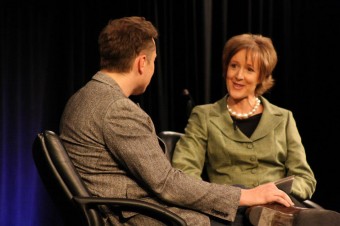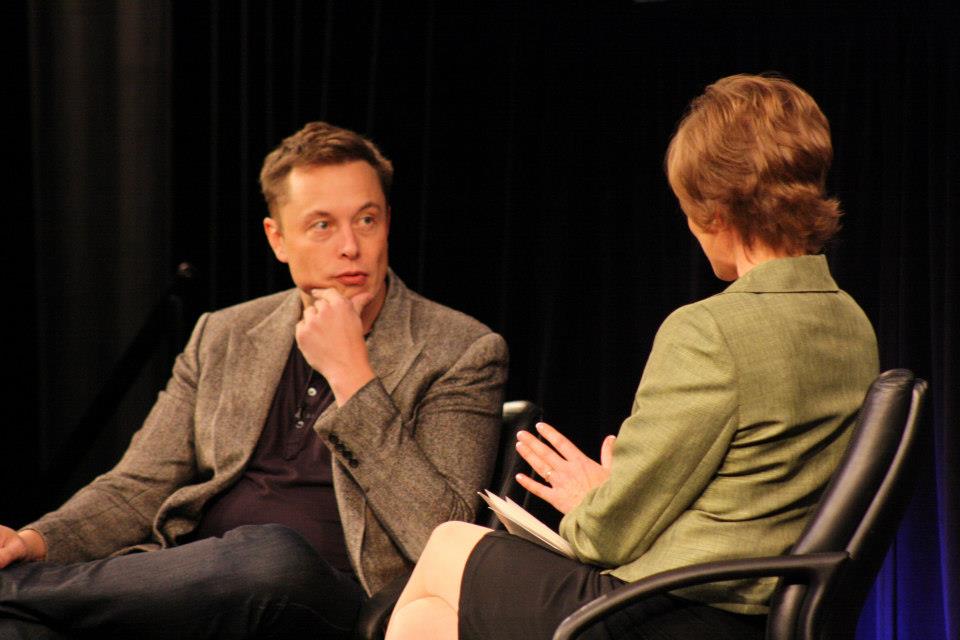By Alison van Diggelen, host of Fresh Dialogues
As the nation anticipates a “climate friendly” State of the Union speech from President Obama Tuesday, let’s take a look at what one of Silicon Valley’s most successful innovators and job creators has to say about the government’s role in climate change and innovation.
Last month, I interviewed Tesla Motors and SpaceX CEO, Elon Musk at the Computer History Museum in Silicon Valley and asked him what specifically President Obama can do to stimulate the economy. He acknowledges that presidents can only do so much, saying,”You’re actually like the captain of a very huge ship and have a small rudder.”
Musk argues that too much government regulation can stand in the way of innovation, especially in the auto industry; and is generally in favor of minimal government intervention in the economy. On climate change, however, he was forceful and described our oil based, carbon intensive economy as creating a “crazy chemical experiment on the atmosphere” with likely catastrophic consequences. He concludes that taxing carbon is vital.
.
Here is the transcript of our conversation:
Alison van Diggelen: Do you feel the government is standing in the way of innovation at all?
Elon Musk: Well sometimes…I don’t think the government tends to stand in the way of innovation but it can over-regulate industries to the point where innovation becomes very difficult. The auto industry used to be a great hotbed of innovation at the beginning of the 20th Century. But now there are so many regulations that are intended to protect consumers…I mean the body of regulation for cars could fill this room. It’s just crazy how much regulation there is. Down to what the headlamps are supposed to be like. They even specify some of the elements of the user interface on the dashboard…some of these are completely anachronistic because they’re related back to the days when you had a little light that would illuminate an image. So we had to reserve space on the instrument panel of the Model S for where all of the indicators…that a car would have…you know you’ve got these little lights…
Alison van Diggelen: Check engine or whatever…
Elon Musk: Yeah…all these little things. There is a whole bunch of them. ‘We can’t have anything else in that space. ‘ But how about we have one space and render a different graphic? ‘Oh no, because people are expecting to see them in this space.’ Nobody is expecting to see them in that space.
Alison van Diggelen: So you can’t argue with these regulations?
Elon Musk: Well you can argue with them, but not with much success. (laughter). You can actually get these things changed, but it takes ages. Like one of the things we’re trying to get is: why should you have side mirrors if you could have say, tiny video cameras and have them display the image inside the car? But there are all these regulations saying you have to have side mirrors. I went and met with the Secretary of Transport and like, can you change this regulation…? Still nothing has happened and that was two years ago.
Alison van Diggelen: So you’re banging your head against the wall…
Elon Musk: We need to get these regulations changed.
 Alison van Diggelen: So talking of government, President Obama is obviously trying to do what he can…if you had five minutes with President Obama, what would you advise him for one: stimulating the economy and entrepreneurship and (two) creating jobs. Is there one thing if he could successfully get through that would be a big stimulus?
Alison van Diggelen: So talking of government, President Obama is obviously trying to do what he can…if you had five minutes with President Obama, what would you advise him for one: stimulating the economy and entrepreneurship and (two) creating jobs. Is there one thing if he could successfully get through that would be a big stimulus?
Elon Musk: I think actually…the reality of being president is that you’re actually like the captain of a very huge ship and have a small rudder (laughter). If there was a button that a president could push that said ‘economic prosperity,’ they’d be hitting that button real fast…
Alison van Diggelen: Full steam ahead.
Elon Musk: You can imagine…the speed of light, how fast they’d be pressing that button. That’s called the re-election button. I’m not sure how much the president can really do. I’m generally a fan of minimal government interference in the economy. The government should be the referee but not the player. And there shouldn’t be too many referees. But there is an exception, which is when there’s an un-priced externality, such as the CO2 capacity of the oceans and atmosphere. So, when you have an un-priced externality, then the normal market mechanisms don’t work and then it’s the government’s role to intervene in a way that’s sensible. The best way to intervene is to assign a proper price to the common good that is being consumed.
Alison van Diggelen: So you’re saying there should be a tax on gas?
Elon Musk: There should be a tax on carbon. If the bad thing is carbon accumulation in the atmosphere, then there needs to be a tax on that. And then you can get rid of all subsidies and all, everything else. It seems logical that there should be a tax on things that are most likely to be bad. That’s why we tax cigarettes and alcohol. These are probably bad for you, certainly cigarettes are (laughter). So you want to err on the side of taxing things that are probably bad. And not tax things that are good. Given that there is a need to gather tax to pay for federal government…We should shift the tax burden to bad things and then adjust the tax on bad things according to whatever’s going to result in behavior that we think is beneficial for the future.
I think currently that what we’re doing right now, which is mining and burning trillions of tons of hydrocarbons that used to be buried very deep underground, and now we’re sticking them in the atmosphere and running this crazy chemical experiment on the atmosphere. And then we’ve got the oil and gas companies that have ungodly amounts of money. You can’t expect them to roll over and die. They don’t do that. What they much prefer to do is spend enormous amounts of money lobbying and running bogus ad campaigns to preserve their situation.
It’s a lot like tobacco companies in the old days. They used to run these ad campaigns with doctors, guys pretending they were doctors, essentially implying that smoking is good for you, and having pregnant mothers on ads, smoking.
Alison van Diggelen: Do you have a message for the climate change skeptics and the big oil people?
Elon Musk: Well, as far as climate change skeptics…I believe in the scientific method and one should have a healthy skepticism of things in general…if you pursue things from a scientific standpoint, you always look at things probabilistically and not definitively…so a lot of times if someone is a skeptic in the science community, what they’re saying is that they’re they’re not sure that it’s 100% certain that this is the case. But that’s not the point. The point is, to look at it from the other side. To say: What’s the percentage chance that this could be catastrophic for some meaningful percentage of earth’s population? Is it greater than 1%? Is it even 1%? If it is even 1%, why are we running this experiment?
Alison van Diggelen: You’ve called it Russian roulette. We’re playing Russian roulette with the atmosphere…
Elon Musk: We’re playing Russian roulette and as each year goes by we’re loading more rounds in the chamber. It’s not wise. And what makes it super insane is that we’re going to run out of oil anyway. It’s not like there’s some infinite oil supply. We are going to run out of it. We know we have to get to a sustainable means of transportation, no matter what. So why even run the experiment? It’s the world’s dumbest experiment (applause).
Read more Transcript Excerpts from our 2013 interview:
On Musk’s South African Childhood, Iron Man Inspiration
On Being the Reluctant CEO of Tesla Motors
On Steve Jobs, Innovation and Critics




